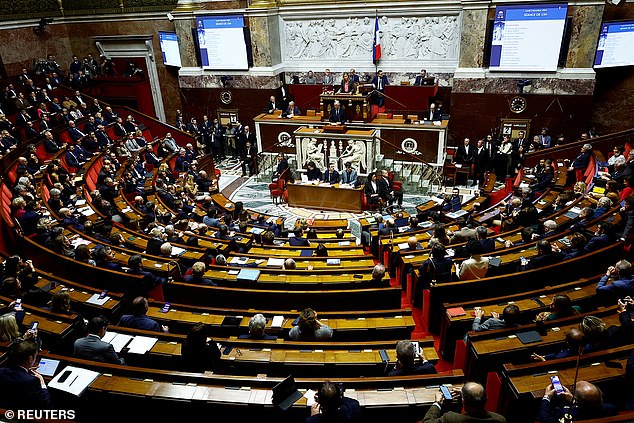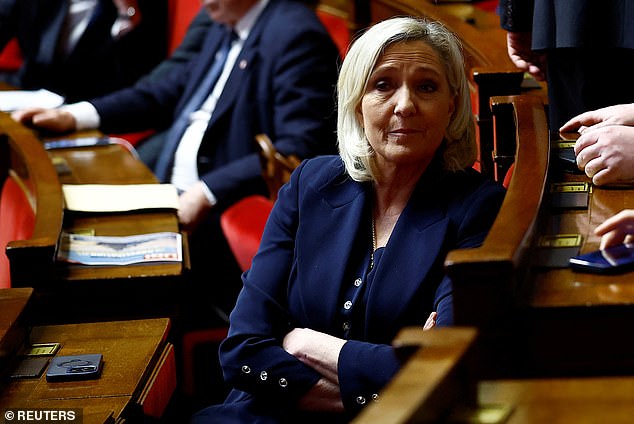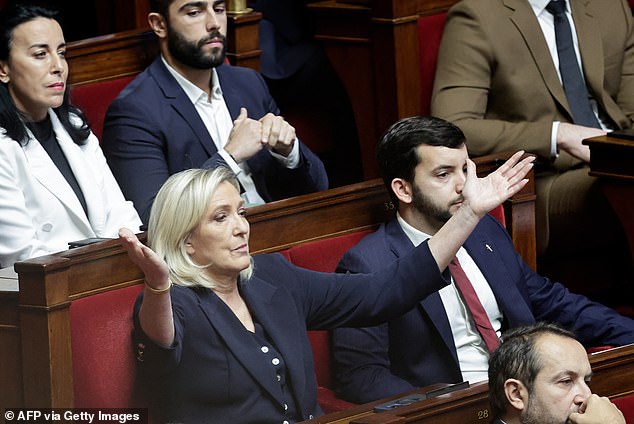France is heading for ‘chaos’ and a financial crisis equivalent to Greece’s collapse in 2008, minister warns as parties prepare a vote of no confidence that will topple the government
France is heading for “chaos” and a financial crisis comparable to Greece’s collapse in 2008, a minister has warned.
Bruno Retailleau issued the dire warning on Tuesday when motions of no confidence against Prime Minister Michel Barnier were presented to the National Assembly.
The right-wing populist National Rally (RN) has pledged to back far-left MPs from the New Popular Front coalition, meaning Barnier has little chance of survival after just three months in office.
“We are at a crucial moment for France,” Mr Retailleau told TF1. “We risk chaos, we risk a financial crisis” similar to the “sovereign debt crisis in Greece in 2008.”
Greece’s crisis following the 2008 global financial crisis came after the country borrowed more money than it could earn through taxes, resulting in a widening expenditure deficit.
Greece had to be bailed out by the European Union and the International Monetary Fund, which sent three packages in 2010 totaling £259 billion. The country then implemented drastic austerity measures.
The economy has started to recover and even grow slowly, although it is 25 percent smaller than when the crisis began and it will take years for Greece to repay its debt worth 180 percent of its GDP, the report said. BBC.
This comes as Mr Barnier pushed through a controversial new social security budget through a presidential decree, bypassing parliament – a move that led to two no-confidence votes to be debated this week that are likely to topple his government .
Bruno Retailleau issued the stern warning on Tuesday, when motions of no confidence against Prime Minister Michel Barnier (photo) were presented to the National Assembly.

“We are at a crucial moment for France,” Bruno Retailleau (photo) told TF1. ‘We risk chaos, we risk a financial crisis’ similar to the ‘sovereign debt crisis in Greece in 2008’

This comes as Mr Barnier pushed through a controversial new social security budget using a presidential decree, bypassing parliament – a move that led to two no-confidence motions to be debated this week that are likely to topple his government .
“It is not the rich who are the first to be affected, it is the most modest, the most vulnerable,” Mr Retailleau said of the new social security budget.
“And during this time, part of the political class is playing Russian roulette. Let’s wake up and prevent what seems inevitable: chaos.’
Mr Retailleau was particularly critical of Marine Le Pen, of the RN, saying she was “totally irresponsible – irresponsible because she is going to mix her votes and those of her deputies with those of the far left.”
Pushing through the measure through a presidential decree is perfectly legal under Article 49.3 of the French Constitution, but the move is seen as an attack on democracy.
President Emmanuel Macron often uses such decrees to get unpopular legislation into the law, leaving his lieutenants to take the blame for the criticism.
Mr Barnier’s budget bill aimed to rein in France’s rising government deficit through £50 billion (€60 billion) in tax increases and spending cuts, but was dismissed by Ms Le Pen and others as “grossly unfair” to the French people .
Explaining why he pushed the policy through without a parliamentary vote, Mr Barnier told the National Assembly in a dramatic speech on Monday afternoon: “The situation is serious, the immediate daily lives of the French are at stake.”
“We will not vote with confidence,” the far-right National Rally party said on parliament.

French hard-right leader and MP Marine Le Pen, chairman of the French far-right National Rally
“The French have had enough,” she told reporters. ‘Maybe they thought things would get better with Michel Barnier, but it was even worse.’
Ms Le Pen, the RN’s designated presidential candidate, previously said Mr Barnier’s €40 billion (£33 billion) in cuts and €20 billion (£16 billion) in tax increases would be a disaster.
For his part, Mr Barnier, the former EU Brexit negotiator, described the measures as essential if France is to control its budget deficit, which is expected to reach 6.1 percent this year.
In a dramatic speech to the National Assembly on Monday afternoon, Mr Barnier said he had “reached the end of the dialogue with opposition parties”, and that “at this moment of truth” it is “time to take action to implement Article 49.3 of the implement the Treaty’. Constitution of the Fifth Republic.
Tomorrow, Wednesday, from 4 p.m., two motions of no confidence will be discussed in the National Assembly in Paris, with a vote around 7 p.m.
This means Michel Barnier could be out of power on Thursday – the three-month anniversary of President Macron’s appointment as prime minister.
No French government has been forced to resign by such a vote since 1962, making the 73-year-old Barnier the shortest-serving prime minister in the history of the Fifth Republic.
Mr Barnier, the former EU Brexit negotiator, is Macron’s fifth prime minister in seven years.

Chairman of the National Parliamentary Group Rassemblement Marine Le Pen gestures during the voting session on the draft of the Social Security Law 2025 in the National Assembly
RN spokesman Jean-Philippe Tanguy said on Tuesday that his party’s decision to try to topple the Barnier government was intended “to protect the French.”
He added: “The budget was dangerous and toxic for France and did not respect the red lines that had been set.”
Mr Tanguy said his party – the largest in the National Assembly – did not support the far left but “defended the national interest”.
The RN’s position is complicated by a lawsuit against Ms Le Pen and other senior party figures over the alleged embezzlement of millions of pounds of cash from the EU.
If the verdict, which is due to take place in March, goes against the RN, Le Pen could face a prison sentence and be barred from running for political office for the next five years, preventing her from participating in the 2027 presidential election.
The New Popular Front alliance won the most seats in the National Assembly during the early elections called by President Macron in June, but has since been banned from playing any role in the government.
